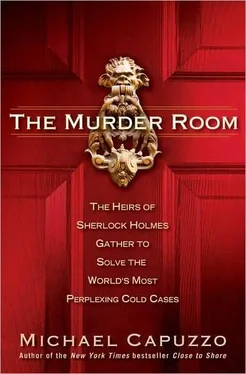Walter looked down at his pad. “Frank Bender is right. He’ll be clean-cut and living in the suburbs. He’ll be married to a compliant woman who has no idea about his past, and present a wholesome image to the community.”
Bender beamed like the father of a newborn son. “I agree with Rich. I think Nauss will be clean-shaven, short-haired, and living in suburbia,” he said. “He’s come from a good family and I think he’ll go back to what he’s known.”
The marshals exchanged doubtful looks across the table. One deputy pointed out that their few leads were consistent with a biker lifestyle. The marshals had set up a cabin in the Poconos for several weeks following a tip that the biker was hiding out in the Pennsylvania mountains. They followed another tip to a Western state, and set up surveillance across from a motorcycle parts distributor, with no luck.
Dennis Matulewicz, one of the lead agents, frowned. “I don’t know about this. A biker is a biker is a biker.”
Walter cleared his throat. “Not only is Frank right that Nauss is hiding in the suburbs, I have some idea what suburbs.”
Rappone leaned forward, his voice nearly caught in his throat. “How do you know that?”
Walter that morning had called the Southern Michigan Prison at Jackson, with 5,600 inmates, the world’s largest penal institution. The massive 1934-era prison complex, known as “Jacktown,” was one of the most notorious and feared of American prisons. Riots in the 1950s and 1970s had killed a guard and injured dozens of guards and inmates. Walter had recently started working there as a prison psychologist, counseling and evaluating the most depraved criminals in the state.
He had spoken on the telephone that morning with an inmate who had been a member of Nauss’s Pennsylvania motorcycle gang.
A heavy silence came over the table.
“Those guys never talk,” a deputy said.
Walter nodded. “Quite true. It is a fact that a gang member, a criminal biker, is a very rigid, power-based personality. As such he is extremely loyal and pathological in how he counts on the group. He has rigid standards and principles.” Walter paused and raised his eyebrow for dramatic effect. “But one can use that rigidity against him.” The marshals fell silent, waiting.
“I made the point that Nauss had shot somebody,” Walter said. “OK, fine, a real man can shoot someone. But he had shot and killed them in front of their child. It’s not macho to kill people in front of their children. It’s not a good thing; he’d broken a rule. And I used that to break apart the biker’s loyalties. Nauss was not living up to biker standards, Nauss was a bad guy, he’d done bad things, he’d not lived by the code a man must live by. I undermined Nauss’s masculinity to get the guy to talk.”
Walter smiled coldly. “I will sometimes sleep with the devil to get what I want. As it happens, Nauss is living somewhere in Michigan.”
Walter picked up several photographs of Nauss. He noted that the biker always wore a shirt that was patterned on one side and not the other. “It’s part of the personality type. He’s a black and white guy; there are no grays. I’ll tell you that when you find him in Michigan, Nauss will be driving a black Cadillac.”
Rappone’s brow crinkled in puzzlement. “How do you know that?”
“Ah,” Walter said. “Fair enough. We know he liked Cadillacs in the past. Cadillacs are prestige cars and he is a power guy who wants prestige and is cleaning up. Particularly rigid types like dark cars. Given his killer instincts it’d be either white or black, and he’d go for black. It’s declarative, pureness and evil at the same time.”
The faces around the table fell open with something like awe.
Bender’s grin grew wider. The marshals planned to present his finished bust of Nauss to America ’s Most Wanted, the Fox TV show. Bender could see that a man like Walter could be of great use in the future.
“It’s not wizardry,” Walter said later as they left the federal building. “It’s all a matter of probabilities. I’ve been around the block a few times.”
“Rich,” Bender said, “you can read criminals’ minds the way I read women.”
Walter’s face darkened around a scowl as Bender’s laugh rang down the gray canyon of Market Street.
In February 1988, America ’s Most Wanted broadcast Bender’s bust of Nauss. The sculpted face of the biker appeared dark-haired and clean-cut. Dozens of calls came in to the show’s tip line with sightings of Nauss from the East to the Midwest, but none amounted to anything.
Assuming he was still alive, the escaped prisoner and convicted killer remained at large.
CHAPTER 15. THE RELUCTANT KNIGHT-ERRANT
Richard Walter was sitting in his small, classical white house in Lansing, Michigan, sipping wine and listening to opera in the civilizing presence of his antiques. The scowling, life-size samurai warrior, sword raised to attack, was a particular favorite. He was recalling his chat that day with a serial killer when the telephone rang, and he frowned.
Walter had been promoted to the largest walled prison in the world, the Southern Michigan Prison at Jackson, from the desolate castle prison on Lake Superior. The high-tech prison gave him remarkable power over the inmates. He could turn off their hot showers by a remote switch, or put them on a diet of “Prison Loaf ”-all their meals blended and baked into a hard, tasteless brick. “You will learn to control yourself or I will control you,” he told them. Control gave him satisfaction, victory over chaos, and thus he found the voice on the telephone disconcerting. It blasted through the line, as loud and excited as a television car pitchman.
“Rich!”
He rolled his eyes. No one else called him that. Although Walter liked the forensic artist, he didn’t enjoy being “shaped” by anyone. Furthermore, he didn’t feel the need for human contact at that moment. He would dispatch of Bender quickly.
“Rich, a producer at America ’s Most Wanted called me, and they want me to do a facial age progression of John List-the most wanted mass murderer in America.”
“That’s wonderful, Frank. I hope it works out for you.”
“He’s the bank vice president who killed his whole family in New Jersey. He’s been on the lam for eighteen years!”
“Yes.”
“He’s committed the most notorious crime in New Jersey since the Lindbergh baby was kidnapped in 1922.”
“It was 1932, Frank.”
“Right.”
Walter said nothing, creating a vacuum in the conversation. It was like a drawbridge pulling up.
Bender waded into the moat. “Rich, I thought maybe you’d want to help me. You could do the profile. I told AMW about you and they’re all for it.”
Walter said nothing. He looked around the room. His music, books, the classical lines of the library-for years these had been his constant companions. Home alone with a bottle of wine, he gazed fondly at his antiques and felt the powerful presence of the men and women who had lived with them; he imagined these spirits as friends and family. He was quite happy living alone. “In point of fact,” he said, “I care not a whit for the general run of humanity.”
Although he was compulsively charming and social, and regaled perfect strangers in bars with true-life Gothic horrors like a slumming Poe, there were few people in the world he could really talk to, even in law enforcement. He had married his profession, driven to be “one of the five best in the world,” and accepted the sacrifices. He was obsessed with things that decent people were happiest not knowing about. His was a dark vision, the same one that made Machiavelli and Dostoevsky embittered men and geniuses for the ages.
Читать дальше












